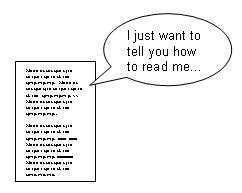 METATEXT
METATEXT
Guiding Readers Academic text in English differs from academic text in Finnish in a number of ways. One significant difference is the observation that English texts “talk more about themselves” than Finnish texts (Mauranen, 1993a, 1993b). This phenomenon is sometimes called metatext. Why does a writer do this? Metatext not only helps the writer to draw the reader’s attention to the structure of the text but also makes the information in the text more accessible to the reader. Metatext can also clarify links between different ideas. Thus, one main purpose of metatext is to explain to the reader how the text should be read. The more difficult or complex the text, the more important it is that writers provide readers with this “assistance.” Building Credibility Another important function of metatext is to try to win readers’ understanding in order to anticipate and protect yourself from potential criticism. Metatext helps writers to take a stance on the subject matter of the text and persuade readers to accept, for example, their claims and their choice of methods. This is done through the use of a number of metatextual devices, including indicating their commitment to a particular view (It is clear that…), distancing themselves from another author’s claim (SD-type algorithms tend to perform well, but...), and stressing solidarity with the readers (However, as we shall see, the problem lies in...). Cultural Differences The more frequent use of metatext in English texts reflects what is typically referred to as a “writer-responsible” orientation (Hinds, 1987). In writer-responsible cultures, the responsibility falls on the writer to make the message explicitly clear to readers. In contrast, Finnish authors tend to take a more “reader-responsible” orientation, working on the principle that it is more respectful to allow intelligent readers to make sense of the text for themselves, and thus avoid “too much” metatext. However, readers of academic texts in English are accustomed to metatext and have learned to expect a lot of it! Without it, something may seem to be wrong. |
| Finnish Virtual University / © 2005 Pennington, Miraftabi, Pitkänen, & McAnsh |